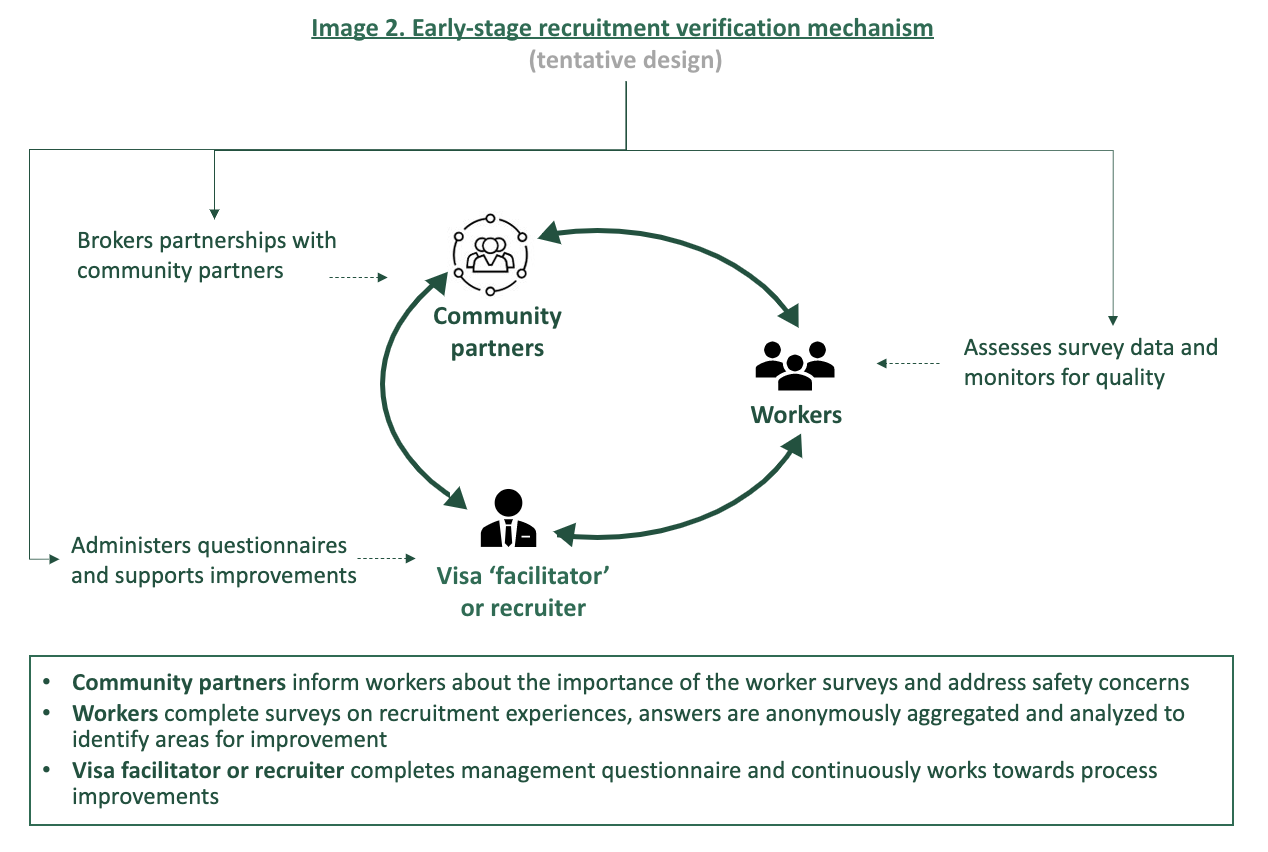The earliest stages of recruitment lay the foundation for seasonal agricultural workers’ experience in the U.S., yet they are also the most opaque, informal, and least regulated. Simple mechanisms that leverage worker voices to infuse transparency in early-stage recruitment practices may be the most promising way to improve oversight. By increasing accountability in recruitment and empowering workers as agents for change, these mechanisms are an important step for improving worker protection from day one.
The temporary agricultural worker visa program, or H-2A, creates hundreds of thousands of job opportunities for foreign farmworkers and is a critical solution to growing labor shortages in U.S. agriculture. However, it is not uncommon for workers to experience misleading, extortionary, or fraudulent recruitment practices. Too often workers end up paying illegal recruitment fees, or taking jobs without receiving important information, like wage and contract terms. Enforcement efforts have been insufficient to combat these issues, in large part because the recruitment process is fragmented with workers passing through different stages with multiple layers.
At every step of the recruitment process, workers interact with different players. In the most fragmented of cases a worker may have talked to a few community contacts with job information, a recruiter, a visa facilitator, and a consulate officer – all before heading to their worksite. Each holding a small piece of access to the job opportunity.

The earliest stage of recruitment is the most informal and least regulated. “Early-stage recruitment” refers to practices and experiences occurring in the worker’s country of origin before they reach the visa application stage. It includes information-sharing about job opportunities, working conditions, the application process, and the selection of candidates to be considered for jobs. Who workers engage with during the earliest stage of recruitment is completely dependent on who in their community is a gatekeeper for access to jobs. For some it may be finding a Facebook ad. A “guy” coming into their community looking for workers. A family member that just came back from a similar work experience. Some employers may ask a worker they trust to find more workers, thus giving that person full power and responsibility over recruitment. Others might be approached by a formal recruitment agency.
Why does early-stage recruitment matter? Malpractice in the earliest stages of recruitment creates an unfair power imbalance for the workers, making them more vulnerable to abuses at the workplace and harder for them to seek a fair grievance process down the line. The early-stage recruitment process can be totally informal and often begins by word of mouth. The individual recruiting may not be even affiliated in any official way to the employer, making the employer blind to practices occurring before workers reach their farm. These blind spots can expose employers and others in their supply chain to lack of regulatory compliance and legal repercussions. In the worst of cases, traffickers and criminals target prospective workers to exploit them, promising job opportunities in exchange for illegal fees. A study done by the Polaris Project reported that the median amount of recruitment fees reported to their trafficking hotline roughly amounted to a whopping $4,000.
In practice, there is very little oversight of the earliest stage of an H-2A worker’s journey. Many existing efforts focus on ensuring responsible practices on the job or by the employer of record. This is critical and targets some of the most egregious issues seasonal guestworkers encounter. But few existing solutions directly address agents engaged in early-stage recruitment. Traditional methods of top-down enforcement are complicated by the fragmentation and informality that characterizes the recruitment process. A different way to create transparency and oversight is needed.
A bottom-up mechanism for continuous improvement of early-stage recruitment practices could bring greater transparency in recruitment. At LaMP, we are collaborating with CIERTO Global and the Equitable Food Initiative in the design of a low-cost, accessible mechanism to monitor and build capacity for better recruitment practices. The mechanism would utilize worker feedback to shed light on recruiters’ early-stage processes. This information would be complemented with support to recruiters to make strides towards a safer, fairer, and more predictable process for workers.
The mechanism would create greater accountability for recruiters and visa facilitators, transparency for employers and retailers, and empower workers to be part of systems improvement. Direct worker surveys on recruitment practices, anonymously aggregated and analyzed by a third-party organization, represent an independent source of information that gives employers and retailers greater visibility into worker experiences. In turn, these powerful stakeholders can hold recruiters responsible for making improvements.
The mechanism would also provide continuous indicators of quality, which could be linked to tangible benefits for recruiters, such as privileged access to potential clients, business mentorship, and financing solutions. This is critical, because if responsible early-stage practices are to be sustainable in a competitive market, they must be paired with benefits that create a market advantage for responsible recruiters or their clients.

If early-stage recruitment practices are overlooked, we will continue to leave blind spots in our ability to protect seasonal workers. We at LaMP are looking for partners to help us design business benefits for responsible recruiters committed to improving their systems. Please reach out if you want to collaborate or have ideas!
The research included in this blog was made possible by the support of the Walmart Foundation. The findings, conclusions, and recommendations presented in this blog are those of Labor Mobility Partnerships (LaMP) alone, and do not necessarily reflect the opinions of the Walmart Foundation.
